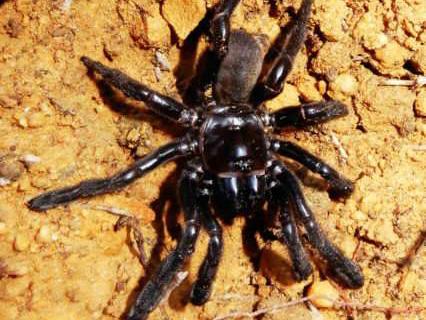World's oldest spider dies aged 43 after wasp attack
Scientists ‘miserable’ to discover record-breaking arachnid laid low by parasitic insect

The world’s oldest spider, a subterranean trapdoor hunter, has died at the age of 43 after being subdued by a parasitic wasp, Australian scientists have reported.
Number 16, as the matriarch was known to researchers, outlived the previous Guinness world record holder – a pet tarantula in Mexico – by 15 years, thanks in large part to living her entire life in a single burrow.
A long-running population study of the trapdoor spiders of Western Australia has tracked the lives of Number 16 and her neighbours since 1974, and her death in October was reported this month in the journal Pacific Conservation Biology.
The researchers say the long and settled life of Number 16 could “provide lessons for humanity” on how to live sustainably.
Trapdoor spiders are ambush predators, and burst from their burrows to snatch smaller prey that walk past.
This low-energy strategy allows them to weather harsh dry environments, and females can be particularly long-lived as they live entirely in their burrows, while males leave in search of a mate.
The population study was initiated by Barbara York Main, now 88, and she was the first to identify and record Number 16 shortly after the spider’s birth.
“To our knowledge this is the oldest spider ever recorded, and her significant life has allowed us to further investigate the trapdoor spider’s behaviour and population dynamics,” said Leanda Mason, a PhD student at Curtin University and the lead author of the study.
“Through Barbara’s detailed research, we were able to determine that the extensive life span of the trapdoor spider is due to their life-history traits, including how they live in uncleared, native bushland, their sedentary nature and low metabolisms.”
Building on Ms York Main’s findings, they hope to give Number 16’s eight-legged kin the best odds of survival, as the research suggests scrub clearances and climate change could harm their chances of challenging the record.
The Telegraph reports Ms Mason and her team were “left miserable” upon discovering Number 16’s demise, having hoped the spider would make it to 50.
Join our commenting forum
Join thought-provoking conversations, follow other Independent readers and see their replies
Comments
Bookmark popover
Removed from bookmarks